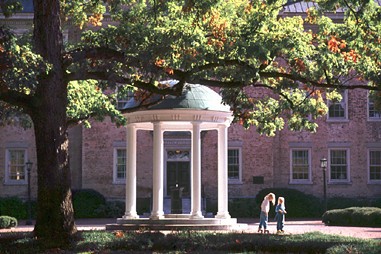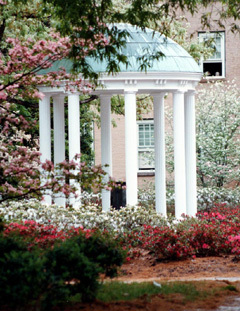Introduction
Carolina is a priceless gem, the birthplace of public higher education in America. World-renowned teaching and research, passionate student activism, first-rate athletics, all found at one of America’s most beautiful college campuses, has made Carolina a destination for some of the world’s best and brightest. In 1789, the same year George Washington became our nation’s founding president; the University of North Carolina was chartered. Only four years later, Carolina became the first public university in the United States to open its doors. Now in its third century, Carolina has evolved from the nation’s first public university to become a leading global university.
When I was looking at universities to apply to, I was searching for schools whose public service mission was just as strong as its academic mission. My college search came to an end the day I took my first step in the ‘Pit,’ the unofficial center of campus and heart of student activism, and I witnessed firsthand the student body’s enthusiasm and passion for public service, for not only thinking but doing.
Carolina recently opened the FedEx Global Education Center, a hub for international studies, and in the fall of 2007 Carolina’s own Dr. Oliver Smithies demonstrated Carolina’s global reach in winning the Nobel Prize in physiology or medicine. In 2003 UNC became the first university to guarantee that its neediest students would graduate debtfree when it established the Carolina Covenant. More than eighty colleges and universities worldwide have followed suit and adopted similar initiatives.
I love UNC. I love the quad in the spring and the arboretum in the fall. I love the Pit on a sunny day and Graham Memorial Lounge on a rainy one. I love Roy all the time. But what makes UNC truly special is not our beautiful campus, our distinguished reputation, or even our basketball team. It’s us—the student body—who make UNC what it is. —Eve Marie Carson, 2008, Former Student Body President
While Carolina has earned a reputation as a global leader in higher education, the university is first and foremost an institution of the people. With programs such as the Carolina Covenant, UNC has strived to make a college education affordable and relevant to all worthy students regardless of socioeconomic status. The university’s commitment to the people of North Carolina and beyond is evident in not only the diversity of its student body but in Carolina’s efforts through ground-breaking research to overcome society’s most pressing challenges, from climate change to world hunger.
The Student Body
That commitment to solving the world’s most daunting problems originates with the chancellor and the faculty, and permeates throughout the lifeblood of the university, the student body. It is not uncommon at UNC for students to join their professors in patenting an invention or publishing in a peer-reviewed journal. The Carolina environment fosters scholarly breakthroughs that are both bold and entrepreneurial in spirit. UNC consistently ranks among the top universities in the United States and is home to both a world-renowned business school and journalism school. About eighty percent of Carolina students graduate within five years after being exposed to a broad-based liberal arts education, completing a rigorous study in their academic major, and often studying abroad for a semester or two. To say that Carolina students are engaged would be an understatement. Whether sleeping outside in the “Pit” to raise awareness of local homelessness or spending a summer in rural India redeveloping contaminated land, Carolina students serve both locally and globally to improve the lives of those less fortunate. When asked by former student body president Eve Carson to sum up in a phrase what makes Carolina so special, former Chancellor James Moeser replied, “Excellence with a heart.” This is the Carolina Way.
The Campus
When not in class, the Pit, or the athletic field, you are likely to find Carolina students enjoying one of the most beautiful college campuses in the nation. While walking the winding brick paths, sitting on the old stone walls, or relaxing in the grassy tree-lined quads it’s easy to understand why they call this place the “southern part of heaven.” Rested atop North Carolina’s rolling Piedmont hills in the college town of Chapel Hill, UNC students enjoy crisp October nights blanketed in the red, orange, and yellow colors of fall. A few light snowfalls are not unheard of during the winter, leaving a dusting of white across campus from the Bell Tower to the historic Old Well. It’s not long until the chill of winter gives way to the blossoming of spring and students can be found sunbathing, tossing a Frisbee, or studying in the lush, green quads at the center of campus.
For students at Carolina education has no boundaries and no limits. The college experience is less about prerequisites, blue books, and double-majors, and more about curiosity, engagement, and progress. For those of you looking to spend all of your college years in a dorm room, a lecture hall, or a library, Carolina may not be right for you. Carolina students, faculty, and administrators live life in the fast lane and are engaged around the world. In sum, Carolina is about breaking down old barriers, discovering new truths, and never settling for anything less than “excellence with a heart.”
Attending Carolina is not an experience; it’s an adventure. Each fall thousands of students from across the country begin their journey from admitted applicant to engaged and impassioned Tar Heel. Carolina students tackle some of the world’s most pressing problems through research and debate, service and engagement, leadership and compassion. Always pushing full-throttle, Carolina students are active inside and out, in the classroom and in the lab, on the athletic field, and in the community.
Students at Carolina receive a world-class education, experience collegiate athletics at its finest, and form relationships with classmates who make up one of the most diverse student bodies in the country. As the nation’s first public university, Carolina remains committed to being the university “of the people” and therefore educates students from all walks of life at a rate affordable to all those who qualify for admission. Carolina provides not only an education but rich experiences, unforgettable memories, and life-long friendships. At Carolina expect not only a quintessential college experience but a wild ride full of late night study sessions and even later nights on Franklin Street. Expect to be not only a listener but a debater, not only a thinker but a doer, not only an activist but a leader paving the way for the millions of Tar Heels who have yet to reach the “shining light on the hill” we call Carolina.


